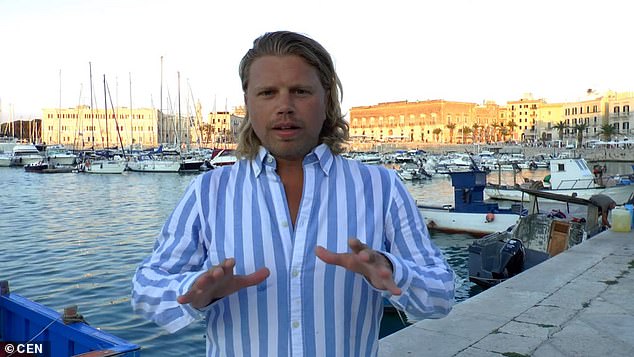Revealed: The cool amount you’ll get for donating sperm as health chiefs increase payments to combat shortages
Britain’s fertility regulator has increased compensation for sperm donations due to a national shortage of samples.
Men were previously paid up to £35 per clinic visit to cover expenses such as travel. It is illegal to pay for sperm donation.
But from today, donors in England, Wales and Northern Ireland will receive £45.
In Britain, men are allowed to help a total of ten families – meaning they can earn hundreds of pounds over the course of their appointment.
Men were paid up to £35 per clinic visit to cover expenses such as travel. It is illegal to pay for sperm donation. But from today, donors in England, Wales and Northern Ireland will receive £45
Health leaders have long feared that the national donor shortage will force women to buy samples from rogue online banks.
However, experts said this is not due to a ‘lack of applicants’ in Britain, but to ‘the lack of quality of applicants’.
Sperm donation is used to help people start a family when they cannot have children of their own – for example, if a male partner is infertile, if both parents are female, or if the mother is single.
In Britain it is regulated by the Human Fertilization and Embryology Authority (HFEA).
Under these rules, all donors are screened for STDs and hereditary medical conditions, such as debilitating asthma, clubfoot and hemophilia.
The HFEA said the increase in compensation was partly due to high inflation in recent years, but cautioned against donating solely for the money.
It is the first time since 2011 that compensation for both sperm and egg donors has increased in all three countries.
Compensation for egg donors has also increased today from £750 to £986.
An HFEA spokesperson said: ‘The choice to become a donor is a complex decision, with implications for the donor and their wider family, the recipient and any child born as a result.
“Donors will undergo rigorous medical screening and must be comfortable with the fact that any children born from their donation will be able to contact them when they turn 18.”
To tackle the shortage, British couples can import sperm into Britain through any accredited fertility clinic, at a cost of almost £950 per dose.
Statistics show that approximately 3,000 samples are supplied annually from Denmark and 4,000 from the US.
Another option is online websites, where people can arrange a donation privately, but HFEA warns there are ‘very real risks and consequences’ of obtaining sperm this way.
However, Nicole Nel, operations and laboratory manager at the London Sperm Bank, believes the shortage is not due to a ‘lack of applicants’ in Britain, but to ‘the lack of quality of applicants’.
She too told the BBC that the way people live can affect the quality of their sperm.
Ms Nel also believes the narrative around the typical sperm donor is changing.
“Maybe 20 years ago it was students, but I think now it’s a very healthy combination of people because infertility has become a more widely discussed topic and awareness around it has increased,” she said.
‘I think the type of person who actually becomes a donor is someone who is more aware of what he or she is doing. It’s not the typical student looking for an easy way to make money.”
The HFEA said British sperm donors usually visit a clinic ‘once a week for three to six months’.
One of these visits involves ejaculating into a sterilized cup and the semen is then frozen and stored.

In July, Netflix premiered the explosive documentary ‘The Man with 1,000 kids’, which investigated Jonathan Meijer (pictured) who defrauded dozens of parents around the world

Women told how they felt ‘betrayed’ and ‘angry’ after discovering how many other children the now 43-year-old musician has fathered
It is not possible to donate anonymously and all donors are advised that any child born can contact them once they turn 18.
In Britain, current rules also mean that a single sperm donor can only create ten families in this country, with each family potentially containing several siblings.
But there are no regulations limiting the number of families donors can create abroad.
Some foreign centers allow sperm donations from the same person to be used to create 1,000 or more separate families.
Experts warn the issue is becoming urgent as more than half of the donated sperm used in Britain is imported from abroad – and demand for sperm donors is growing due to an increase in the number of single women and female couples from same sex having children.
The number of female same-sex couples undergoing IVF increased by 33 percent between 2019 and 2021, according to fertility regulator the Human Fertilization and Embryology Authority (HFEA).
Last year, Professor Jackson Kirkman-Brown, president of the Association of Reproductive and Clinical Scientists, warned that it could be “psychologically damaging” to children if they discover they have hundreds or even thousands of half-siblings.
He said: ‘If you’ve always thought you have an incredibly special gift, it’s a very difficult concept to suddenly discover that there are 300 people who share 50 percent of your DNA.’
Research also shows that donor-conceived people often feel pressure to keep in touch with dozens of half-siblings, but this can be ‘almost an impossibility’ and cause great stress.
In July, Netflix premiered the explosive documentary ‘The Man with 1,000 kids’, which investigated Jonathan Meijer’s scam of dozens of parents around the world.
Women have told how they felt ‘betrayed’ and ‘angry’ after discovering how many other children the now 43-year-old musician has fathered.
